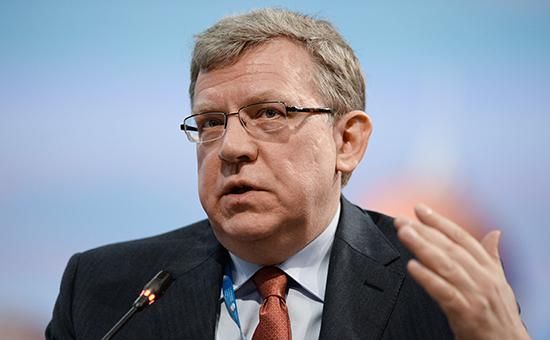 Vladimir Putin's long-time ally suggested Thursday that the Russian president could order an early vote to win a mandate for much-needed economic reforms, comments that sent shock waves through Russia's business and political elite.
Vladimir Putin's long-time ally suggested Thursday that the Russian president could order an early vote to win a mandate for much-needed economic reforms, comments that sent shock waves through Russia's business and political elite.
Russia's economy, hit by Western sanctions and its own dependence on oil prices, has entered a recession, dropping 2.2 percent in the first quarter of the year. Prominent economists have warned that unless Russia makes drastic reforms, it is doomed for stagnation.
Alexei Kudrin, Russia's finance minister from 2000-11 and the man who invited Putin in for a job in Russia's presidential administration in the late 1990s, suggested at an investment conference Thursday in St. Petersburg that Putin could hold an early election in order to "win the mandate" for economic reforms.
Speaking to The Associated Press, Kudrin said he hadn't discussed the idea with Putin, whose current term expires in 2018. Still, he insisted the move was necessary, because of a "dire need of serious measures to restore the economy."
"If you're not ready to conduct (structural reforms) before the re-election, which anyone hardly does, then you need to do it after the election and do the election early," Kudrin explained.
Kudrin, one of the few believed to still have Putin's ear, said Putin may not be prepared to undertake the painful reforms just now.
"He is a pragmatic man with an acute feeling of the political situation and it is possible that he will delay the reforms," he said.
Putin, who has ruled Russia since 2000, began his third term in 2012 amid massive anti-government protests and low approval ratings. Those ratings then skyrocketed last spring after Russia annexed Crimea.
Sergei Neverov, a senior lawmaker at the ruling United Russia party, accused Kudrin on Thursday of trying to "destabilize the society" with his provocative statements.
Russia's economy is in recession and its manufacturing and investment are declining as the country reels from lower commodity prices, the backbone of its economy.
But the recession is only partly a product of Western sanctions, Kudrin said, adding it was largely because Russia has not addressed its oil dependency, has not reformed its court system and did not improve its investment climate. The current government policy, according to Kudrin, addresses only short-term goals and is not looking further than three years ahead.
In an interview Thursday with The AP, Deputy Prime Minister Arkady Dvorkovich sought to contest claims that the Kremlin has given up on economic reforms.
"We're committed to big structural reforms, we've improving the investment climate," Dvorkovich said, quoting Russia's recent progress in moving up in ratings that rank where doing business is easiest.
The Russian parliament, meanwhile, is expected to give the green light next week to a bill that would allow the 2016 parliamentary election to be moved from December to September — a move that critics have interpreted as an attempt to weaken the opposition.
In an opinion piece in the RBK newspaper, Mikhail Khodorkovsky, Russian tycoon who spent ten years in prison after running afoul of Putin's government, this week warned of a clash between the interests of Russian elites, who are advocating isolationist policies and militarization, and those of ordinary Russians, who want better schools and health care.
In Kudrin's opinion, there is no such clash, but he says many of the elite are reluctant to voice any dissent — silence that he says is dragging down the Russian economy.
"The elites are silent and don't talk about certain things openly because of our domestic political peculiarities," Kudrin said. "This is bad. This slows down the review of our goals and slows down the reforms."
 В Атырау -10
В Атырау -10